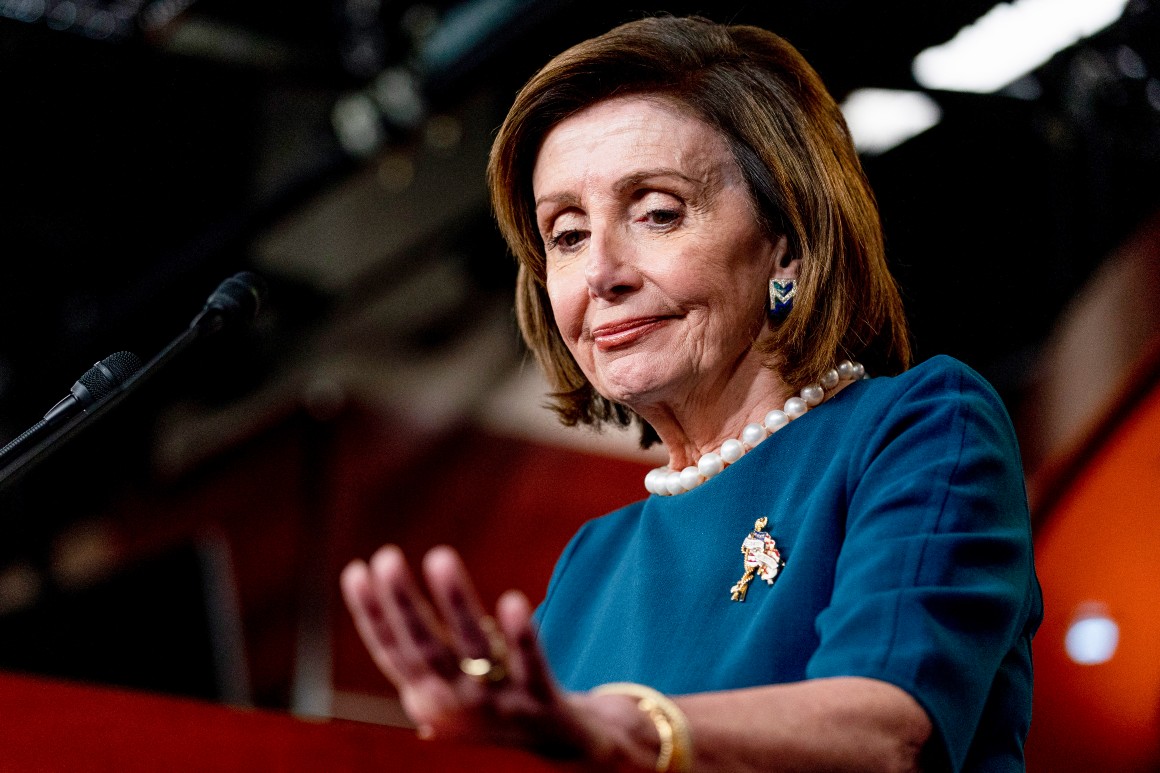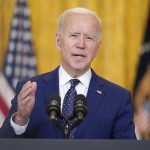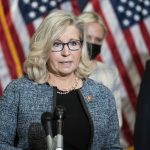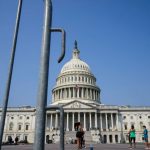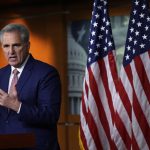House liberals left the Capitol triumphant on Thursday night after once again scuttling a major vote. Every other Democrat was fuming.
For the second time in less than a month, Speaker Nancy Pelosi and her leadership team had to delay a vote on Senate-passed infrastructure bill amid progressive opposition, denying President Joe Biden a much-need win as Democrats’ bigger, $1.75 trillion social spending plan also remains in limbo.
“I think it’s wholly apparent that today was not a success,” said Virginia Rep. Abigail Spanberger, whose state has a high-stakes gubernatorial showdown Tuesday that Democrats were hoping to boost with the infrastructure vote.
“Because people choose to be obstructionists, we’re not delivering these things to my state or to the rest of the country,” the swing-district Democrat added. “I guess we’ll just wait because apparently failing roads and bridges can just wait in the minds of some people.”
Democrats slunk out of the House chamber embarrassed — furious at the liberals who dug in and a White House that refused to pressure them to relent — and openly fretting about the long-term repercussions, given the tough climb they face in the midterms. Progressive leaders are predicting the party will work out its differences and pass both bills in the House within days. But it’s a far cry from what top Democrats had hoped to deliver ahead of a critical week for the party.
“If I’m going to be honest, yeah, I’m worried about it,” said Rep. Gregory Meeks (D-N.Y.). “There’s a lot on the line here — a lot on the line. … We fill our cup up by getting stuff done. It’s not over.”
The party started with a clear plan for this week: send a $550 billion infrastructure bill to Biden’s desk that would start his foreign trip with a marketable victory and offer a much-needed boost to Virginia Democratic candidate Terry McAuliffe ahead of a nail-biter gubernatorial election Tuesday.
Instead Democrats are going home with nothing to show but a short-term extension of highway and transit programs and promises to reconvene next week and try again. Senior party members insist they had good reason to believe this week would be different from late September, when another wall of liberal opposition forced Pelosi to punt an infrastructure vote.
This time they had a Biden-blessed deal, a chunk of legislative text and a full-throttle whipping operation.
They still couldn’t overcome the trust gap between the party’s liberals and their moderate colleagues across the Capitol: Sens. Kyrsten Sinema (D-Ariz.) and Joe Manchin (D-W.Va.).
“All they need to do is one simple thing, which is to affirm they are in agreement with the framework. They just need to publicly announce it. Clearly they aren’t willing to do that, which is saying a lot,” said Rep. Ruben Gallego (D-Ariz.), who has not ruled out a primary challenge to Sinema.
The House’s departure Thursday night virtually guaranteed there would be no major vote on Biden’s agenda ahead of McAuliffe’s election on Tuesday. If he loses, many Democrats worry that could spell doom for their already-teetering domestic agenda as the party’s two wings continue to bicker over the contours of their $1.75 trillion spending package.
“Our whole argument as Democrats is premised on the idea that we’re going to make things better in real life. As opposed to the other side, which just constantly lies and seems to live in a world of misinformation and fantasy,” said Rep. Conor Lamb (D-Pa.).
“But if we’re going to win that argument," he added, "we actually have to do the things we said we’re going to do.”
While the rest of the caucus seethed, progressives defended their refusal to support the infrastructure bill amid lingering uncertainty about Sinema and Manchin’s commitment to the social spending framework Biden unveiled Thursday morning.
“I told anybody that would listen that we did not have the votes for [an infrastructure] vote tonight,” said Congressional Progressive Caucus Chair Rep. Pramila Jayapal (D-Wash.).
Jayapal went on to say that Biden did not explicitly ask for a vote on the infrastructure bill when he visited the Hill Thursday morning — which many on the left took as a tacit green light to continue opposing Democratic leadership’s push for a vote until they were ready. Biden’s lack of a clear demand for a Thursday vote may have had the unintended effect of emboldening liberals, giving them political cover to tank an infrastructure bill that Pelosi and other leaders were whipping.
“The speaker did, but the president did not” ask for Democrats’ infrastructure vote, Jayapal said. “The president said he wants us to pass both bills and that this coming week was going to be critical for that. We will deliver both these bills to him, from the House, next week.”
Senior Democrats were privately frustrated at Biden’s lack of direct call to action, and some sought to convince the White House to further clarify his position throughout the day, with no success.
“Had the president led us down that hallway to the House floor this morning … I think it would have been close,” said Rep. Dean Phillips (D-Minn.). “If the vote was kept open a long time, I think with Republican votes it would have passed.”
There’s another key difference between this week and Democrats’ infrastructure retreat in late September: It’s not just moderates who are irate.
“The president of the United States, the president of our own party, asked for our help before he traveled overseas. And the speaker asked for our help, and we didn’t deliver,” said Rep. John Larson (D-Conn.), a longtime ally of Pelosi’s.
Finger-pointing began quickly within the narrowly divided caucus. But some Democrats acknowledged privately they weren’t even sure where to direct their frustrations after such a chaotic round of negotiations.
For moderate Democrats, it was more salt in the wound.
“I’m frustrated for my constituents and for my country. President Biden came to our caucus and asked us to deliver for him,” said Rep. Stephanie Murphy (D-Fla.), one of the centrists who had secured a commitment from party leaders to vote on infrastructure back on Sept. 27. Thirty-one days later, it still hasn’t happened.
“Yet again, a small group of my colleagues have decided to vote not on the merits of the bill but on this misconstrued idea of leverage and are denying the American people much-needed infrastructure investment," Murphy added.
Some members were more measured in their response, although clearly irritated.
“We set deadlines, we miss deadlines. We’re in late, we get out early. Sometimes we meet expectations, sometimes we don’t,” said Rep. Gerry Connolly (D-Va.).
But when asked about what progress had been made in the last month, Connolly responded that “it’s a loaded question, and I don’t like loaded questions." He then detailed the steps his party has taken in reaching a deal on their $1.75 trillion social spending plan, which invests in a range of areas, from child and elder care to clean energy initiatives and health care for low-income Americans.
Democratic leaders were tight-lipped as the House voted to punt transportation funding again with their major bills hanging in the balance.
“We’ll get it done,” said House Majority Leader Steny Hoyer.
Asked if he remembered describing the same situation last month as “not a success,” Hoyer quipped: “Yes — and that made the headline, as I recall.”
Nicholas Wu contributed to this report.
